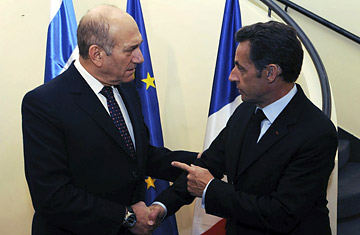
Israeli Prime Minister Ehud Olmert, left, meets French President Nicolas Sarkozy in Jerusalem on Jan. 5
Efforts by French President Nicolas Sarkozy and other European leaders to broker a cease-fire in Gaza have so far come to naught. The problem confronting them and any potential peacemakers in the region is that the Israelis don't want a truce that falls short of their goal of defanging Hamas, while the Palestinian radical group is hardly ready to run up the white flag.
"We know perfectly well that all this is difficult and the European effort is risky," Sarkozy said on Monday after his meetings with Egyptian, Palestinian and Israeli leaders made virtually no headway toward a truce. "But if we don't take the initiative to come and find paths to peace when confronted with such a dramatic situation as this, when would we?"
The approach of Sarkozy and Czech Foreign Minister Karel Schwarzenberg in their parallel missions was basic enough: win agreement for an immediate, 48-hour cease-fire by both Israel and Hamas to allow humanitarian aid to enter and circulate throughout Gaza and treat civilian victims caught in the violence. Once the guns were silent, a longer-term peace process was to flow from that, beginning with the opening and policing of Israeli and Egyptian border crossings into Gaza and the lifting of the crippling economic blockade of the area. Hamas has cited the blockade as its prime reason for abandoning the previous cease-fire, which had kept things largely quiet from June to November. To accommodate Israel's security concerns, the Europeans are also proposing the deployment of international troops to prevent the smuggling of weapons that would allow Hamas to rearm for future attacks on Israel. (See pictures of heartbreak in the Middle East.)
But that proved a tough sell to the main players.
First off, Israel has no interest in stopping its military mission until its primary aims have been achieved, and those aims appear to be evolving from simply stopping rocket fire into southern Israel into what Foreign Minister Tzipi Livni calls "changing the equation" in Gaza — i.e., hobbling Hamas to the point that it loses control of the territory. The Israelis believe they have Hamas on the ropes and may be in no hurry to back off from trying to deal a mortal blow to the radical group. That means their diplomatic posture will be to seek more time for their military operation and then hold out for truce terms that essentially codify a military disabling of Hamas. (See pictures of Israel's invasion of Gaza.)
But Israel's agenda is hardly the only obstacle. Egyptian President Hosni Mubarak, who met with Sarkozy on Monday, rebuffed the idea of international forces patrolling his border in search of smugglers bringing weapons into Gaza. Mubarak insists Egyptian police and military have choked off that supply and that the weapons now come by sea — although Israeli officials see the tunnels from Egypt as the primary smuggling route. Mubarak is hostile to Hamas, an offshoot of Egypt's banned but popular Muslim Brotherhood, and has long insisted that he will open the Rafah border crossing into Gaza only if the Palestinian side is policed by security forces loyal to Palestinian Authority President Mahmoud Abbas.
Sarkozy ran into further trouble on Monday afternoon when he met in Ramallah with Abbas and sought to ingratiate himself with the Palestinian Authority President by declaring that "Hamas is to blame for the suffering of the Palestinians." That may have been music to the ears of Abbas, but he is a marginal figure in the conflict currently raging, and Sarkozy's comments prompted Hamas — the key Palestinian player in Gaza — to denounce the "total bias" of Sarkozy's initiative. What's more, by having followed the U.S. lead in declaring Hamas off-limits because it is a terrorist organization, the E.U. is now prevented by its own rules from engaging directly with the organization in a mediating role.
Sarkozy played his diplomatic trump card on Tuesday, visiting Syrian leader Bashar Assad — the key regional patron of Hamas, who also owes the French President a favor for his controversial diplomatic rehabilitation of the Syrian strongman last summer — to plead with Syria to "weigh on the actors, notably Hamas, so that peace may return." Assad's response, denouncing Israeli "war crimes" in Gaza, suggested little enthusiasm for holding Hamas' feet to the fire.
The limited traction of the efforts by Sarkozy and the Czechs, who currently hold the rotating E.U. presidency, is a reminder that the diplomatic centers of influence in the current conflict lie elsewhere. "Europe has no real influence to dramatically change things in a region where the U.S. remains the only power anyone listens to," says Philippe Moreau Defarges, a European-affairs specialist at the French Institute for International Relations in Paris. "Still, Europe had to try something in the face of two dire factors: America's irresponsible refusal to get involved now and the terrible failure of Bush Administration policy in the region that the current crisis arose from."
Indeed, Washington is not just remaining on the diplomatic sideline; it is actively restraining the efforts of others to force an immediate halt to the Israeli operation. Sarkozy was angered by the Bush Administration's move on Saturday to block a U.N. resolution demanding an immediate halt to hostilities. "Those who applaud today," Sarkozy growled, "won't be there tomorrow to get us out of this mess." Nor will the European efforts, however. Achieving a truce will require involvement by those with leverage over the key players.
"It's evident the movement we're seeking to create needs the support and assistance of the big actors in the area," a French diplomat involved in the current initiative says. "That means Egypt, Turkey and Syria using the different pull they have — especially with Hamas — and the U.S. in its unique relationship with Israel."
